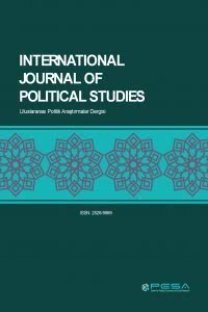SAHARAN AFRİKA'DAKİ POPULİZMİN YANLIŞI VE EVRİMİ: PARTİ SİYASETİ VE KİŞİSELLEŞMELER
Sömürge sonrası Afrika’nın ilk yıllarında, bağımsız Afrika’nın birçok devrimcisi ve lideri, sömürücü sömürücü deneyimlerinden on yıllarca süren durgunluktan sonra ekonomi, sosyal yaşam ve kültüre göre Afrika’nın işleyişini ilerletmek ve eski haline getirmek amacıyla siyasi eylemlerde bulundu. Bazı ülkeler, tüm Avrupalı yerleşimcilerin sınır dışı edilmesi ve sömürge döneminde edinilen toprağın geri kazanılmasının devlet mülkiyetine geri verilmesi çağrıları biçiminde siyasi ideolojide radikal bir dönüşüm yaşadı. Bu popülist eylemler Afrikalıların çoğunluğu tarafından iyi karşılandı. Ancak kıtada, marjinalleşme politikalarıyla nitelendirilen bir dizi kötü yönetişim deneyimi yaşandıktan sonra, siyasi liderlerin iktidarı elde etmek ve güçlerini uzatmak için sömürdüğü ekonomik gelişme vaadi üzerine kurulan kıtada yeni bir popülizm türü ortaya çıktı. parti politikaları, anayasa değişiklikleri ve seçim yanlışlıkları yoluyla sınırlamalar. Bu makale, ekonomik gelişme, etnik köken, siyasi parti yarışmaları ve ideoloji gibi faktörlerin ışığında, Güney Afrika, Ruanda ve Zambiya deneyimlerini referans alarak popülizmin farklı yüzlerini ele alıyor.
Anahtar Kelimeler:
Popülizm, Afrika, Gelişmekte Olan, Siyasal Partiler, Etnisite
THE EMERGENCE AND EVOLUTION OF POPULISM IN SUB-SAHARAN AFRICA: PARTY POLITICS AND PERSONALITIES
In the earlier years of post-colonial Africa, many revolutionaries and leaders of independent Africa embarked on political actions meant to advance and restore African affairs relative to the economy, social life and culture following decades of stagnation from the highly exploitative colonial experience. Some countries experienced radical transformation of political ideology in form of calls for the expulsion of all European settlers and the reclamation of land acquired during the colonial period back to state ownership. These populist actions were well received by a majority of Africans. But following a sequence of bad governance experiences within the continent that has been characterized by politics of marginalization, a new breed of populism has emerged on the continent founded on the promise of economic development with which political leaders have exploited to acquire power and extend their term limits through party politics, constitutional changes and electoral malpractices. This paper addresses the different faces of populism in reference to the experiences of South Africa, Rwanda and Zambia in light of factors such as economic development, ethnicity, political party competitions and ideology
Keywords:
Populism, Africa, Under development, Political Parties, Ethnicity,
___
- Bogaards, M. (2008). ‘Dominant Party Systems and Electoral Volatility in Africa’. Party Politics, 14 (1): 113–30.Bassett, C., and M. Clarke (2008). ‘The Zuma Affair, Labour and the Future of Democracy in South Africa’. Third World Quarterly, 29 (4): 787–803.Brown, K. (2008). ‘Hustling Voters on the Dusty Streets of Sedibeng’. Business Day, 15 October:Bryceson, D. (2006). ‘Fragile Cities: Fundamentals of Urban Life in East and Southern Africa’. In D. Bryceson and D. Potts (eds), African Urban Economies: Viability, Vitality, or Vitiation? New York, NY: Palgrave MacmillanCanovan, M. (1999). ‘Trust the People! Populism and the Two Faces of Democracy’. Political Studies, XLVII: 2–16.Chege, M. (2008). ‘Kenya: Back from the Brink?’. Journal of Democracy, 19 (4): 125– 39.De Wet, T, L. Patel, M. Korth, and C. Forrester (2008). Johannesburg Livelihoods and Poverty Study. Johannesburg, South Africa: Center for Social Development in Africa, University of Johannesburg.Dietz, H. A. (1998). Urban Poverty, Political Participation, and the State: Lima, 19701990. Pittsburgh, PA: University of Pittsburgh Press.Foster, D. (2009). ‘Jacob’s Ladder’. The Atlantic (June): 72–80Gumede, W. M. (2008). ‘South Africa: Jacob Zuma and the Difficulties of Consolidating South Africa’s Democracy’. African Affairs, 107 (427): 261–71.Hansen, K. T. (2002). ‘Lusaka, Zambia’. In M. Ember and C. R. Ember (eds), Encyclopedia of Urban Cultures: Cities and Cultures Around the World. Danbury, CT: Grolier Publishing Co. IncHansen, K. T. (2007). ‘The Informalization of Lusaka’s Economy: Regime Change, Ultra-Modern Markets, and Street Vending, 1972-2004’. In J. B. Gewalt, M. Hinfelaar and G. Macola (eds), One Zambia, Many Histories: Towards a Post-Colonial History of Zambia. Leiden, The Netherlands: J. Brill.Johnson, R. W. (2008). ‘Mosiuoa “Terror” Lekota Threatens to Topple the ANC’. The Sunday Times. 19 October.Kessides, C. (2006). The Urban Transition in Sub-Saharan Africa: Implications for Economic Growth and Poverty Reduction. Washington, DC: The World Bank.Lodge, T. (2002). Politics in South Africa: From Mandela to Mbeki. Bloomington, IN: Indiana University Press.Madrid, R. L. (2008). ‘The Rise of Ethno-populism in Latin America’. World Politics, 60 (3): 475–508.Mwiinga, J. (1993). ‘Vendors Are Now a Law unto Themselves’. The Weekly Post. 26 March-1 April: 5.Manning, C. (2005). ‘Assessing African Party Systems after the Third Wave’. Party Politics, 11 (6): 707–27.Rakner, L., and N. van de Walle (2009). ‘Democratization by Elections? Opposition Weakness in Africa’. Journal of Democracy, 20 (3): 108–21.Roberts, K. M. (2007). ‘Latin America’s Populist Revival’. SAIS Review XXVII (1): 3– 15.Saunders, C. (2005). ‘South Africa: Recent History’. Africa South of the Sahara. New York, NY: Routledge.Statistics South Africa (2009a). Quarterly Labour Force Survey. Pretoria, South Africa.Statistics South Africa (2009b). Gross Domestic Product: Annual Estimates 1993-2008, Regional Estimates 2000-2008, Third Quarter 2009. Pretoria, South Africa.United Nations Human Settlements Programme (UN-Habitat) (2003). The Challenge of Slums: Global Report on Human Settlements 2003. London, UK: Earthscan Publications Ltd.Weyland, K. (1999). ‘Neoliberal Populism in Latin America and Eastern Europe’. Comparative Politics, 31 (4): 379–401. Wines, M. (2006). ‘Strong Challenge to Zambia’s President’. The New York Times. 29 September
- Başlangıç: 2015
- Yayıncı: Politik Ekonomik ve Sosyal Araştırmalar Merkezi
Sayıdaki Diğer Makaleler
SAHARAN AFRİKA'DAKİ POPULİZMİN YANLIŞI VE EVRİMİ: PARTİ SİYASETİ VE KİŞİSELLEŞMELER
İsrael Nyaburi NYADERA, Billy AGWANDA
HÜKÜMET SİTEMLERİNE GÖRE OECD ÜLKELERİNDE KİŞİ BAŞINA DÜŞEN MİLLİ GELİR
AFRİKA'DA YASADIŞI BALIKÇILIK VE TÜRKİYE-AFRİKA İLİŞKİLERİ BAĞLAMINDA ÖNERİLER
